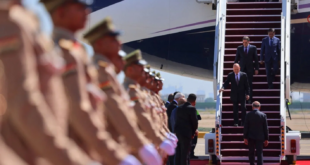Much is still uncertain about the new AUKUS ‘enhanced trilateral security partnership’. The deal for at least eight nuclear submarines to be built in Australia is described as a ‘first initiative’ but the partnership’s aims, and whether there will be a governing treaty, are not yet clear.
Nor is the practical form that engagement in other foreshadowed areas will take. For Australian defence officials wrestling with the search for an ‘optimal pathway’ to get the submarine project under way, it will be a busy 18 months as a massive list of regulatory, technological, security and workforce issues present themselves.
Boris Johnson, Joe Biden and Scott Morrison each had something to prove with this agreement. Johnson was looking for a way of demonstrating that Britain had a global future after Brexit while taking over handy trade prospects from the French.
Joe Biden wanted to put the Afghanistan withdrawal behind him and show he was adding substance to his pledge to refocus US strategic energy on its competition with China and Russia. And Morrison was able to execute a Houdini-like escape from his government’s troubled French attack-class submarine project which looked likely to deliver him only political pain.
It was the British industrial dimension that determined that the partnership, for reasons that are not clear, would become a threesome. Dependent on the United States for elements of the nuclear propulsion system, Britain could not transfer the technology without Washington’s approval.
Nuclear submarines offer Australia strategic and operational benefits. They go further and faster and stay longer at sea than their conventional counterparts.
But they have one large strike against them. We cannot operate them alone. The capability they provide is only available to us if we cede a degree — quite a high degree in this case — of Australian sovereignty.
Our capacity to operate the nation’s most expensive and powerful defence asset will always be subject to US veto and the program will lead inevitably to deeper operational integration with the United States. In response to a question in Washington after the Australia-US Ministerial Consultations (AUSMIN), Peter Dutton spoke positively about the US ‘basing and … the storage of different ordnances’.
No one is pretending that this agreement is not directed at China. For several years now, Australian policymakers have been at the vanguard of international resistance to China’s growing ambitions. The submarine deal will reinforce Beijing’s conviction that Australia is part of an integrated US co-ordinated response to — let’s utter the word — ‘contain’ China.
The conclusion China draws will be the mirror image of Australia’s own: we cannot become dependent on this hostile state and must diversify our economic interests.
So at a time of rising Australian debt generated by the COVID-19 response, and with the new submarine program certain to make heavy increased demand on defence expenditure (including in compensation to the French), the economic implications are real. The OECD Economic Survey noted last week Australia’s vulnerability to a future shock in the Chinese economy or import restrictions on additional commodities, such as iron ore.
The new agreement does not just back Australia into greater military integration with the United States, but into a more direct foreign policy alignment. During the Cold War and the war on terror, Australia was marginal to Washington’s main geopolitical concerns in Europe and the Middle East. We could, and did, go on managing our relationships around this region independently and driven by different imperatives.
Of course, that will not be impossible now, but it will be harder to disentangle our strategic commitments and our deep identification with the United States and Britain from our foreign policy interests. US expectations of Australian support in almost any contingency, whether it involves China or not, will grow.
How should Australia respond to China’s rise? Deterrence against military aggression certainly. But for the other dimensions of statecraft available to us — persuasion, shaping, multilateral advocacy, coalition building — AUKUS is not much help. France’s humiliated reaction to its dumping doesn’t augur well for our recent efforts to engage more actively with Europe in the Indo-Pacific.
So the agreement is a big Australian bet on the future of the United States, and at a more uncertain time in American politics than at almost any point in the history of the alliance.
It is true that concern about China ‘eating our lunch’, in Biden’s words, is probably the only reliably bipartisan element in US politics these days, and a sentimental attachment to Australia comes somewhere up there too.
But although it is hard to see it in the Australian foreign policy discussion these days, China is not the only issue in the world. It is quite possible that in three years’ time Donald Trump, or someone like him, will be back in the White House with policies that would be deeply uncomfortable for an Australian government.
AUKUS will be a sign to our neighbours that the Anglosphere is back. That Australia is in its comfortable place, locked down and hanging out with the family. This is a ‘forever partnership’, says Scott Morrison, assuming a perpetual alignment of interests between our three countries and forgetting chunks of Australian diplomatic history. Even America’s ‘forever wars’ lasted only 20 years.
 Eurasia Press & News
Eurasia Press & News



